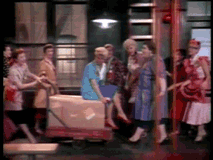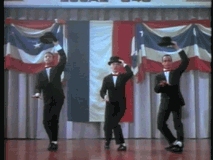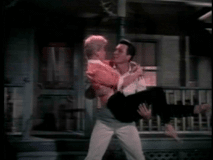The Pajama Game (Stanley Donen) 1957
 To combine social realism with the 50’s Hollywood musical seems impossible,
but Stanley Donen nearly brings off that improbable match in his 1957 film The
Pajama Game. Real world issues are the last things one would expect in a
Doris Day vehicle, and Donen doesn’t really burden the audience with a sense
of societal strife. What he does do, however, is incorporate the political
concerns of the movie, which follows a group of unionized textile workers, into
the cushy framework of his musical. The songs are as likely to make reference to
pay raises and work quotas as love. It’s really a subversive move, sneaking
radical political thought into a genre as conservative as the Hollywood musical
is, and that we don’t feel pounded on the head by that message is no small
achievement. That we’re able to occasionally forget the real-world
significance of the film and enjoy ourselves is almost amazing.
To combine social realism with the 50’s Hollywood musical seems impossible,
but Stanley Donen nearly brings off that improbable match in his 1957 film The
Pajama Game. Real world issues are the last things one would expect in a
Doris Day vehicle, and Donen doesn’t really burden the audience with a sense
of societal strife. What he does do, however, is incorporate the political
concerns of the movie, which follows a group of unionized textile workers, into
the cushy framework of his musical. The songs are as likely to make reference to
pay raises and work quotas as love. It’s really a subversive move, sneaking
radical political thought into a genre as conservative as the Hollywood musical
is, and that we don’t feel pounded on the head by that message is no small
achievement. That we’re able to occasionally forget the real-world
significance of the film and enjoy ourselves is almost amazing.
 Auteur theory seems awfully suspect whenever you look at a
musical, since the genre’s fusion relies on the successful collaboration of so
many talents. The transcendent enthusiasm found in the best musicals is
definitely present here, but I wouldn’t dare give all of the credit to Donen. The
Pajama Game is based on a highly successful play that ran for a few years
before the film was made. Certainly, the performers, especially Doris Day and
Carol Haney, give this material their all, infusing each scene with infectious
gusto. John Raitt (Bonnie Raitt’s
father) play’s Day’s love interest / supervisor with a good degree of
affable charm, and the subsequent romance is engaging. Bob Fosse’s imaginative
choreography and the great set design transform locales as unlikely as the work
floor and the picket line into chorus lines. Considering the subject matter, the
costuming is appropriately grounded, usually going for grit over glamour.
There’s little to complain about here.
Auteur theory seems awfully suspect whenever you look at a
musical, since the genre’s fusion relies on the successful collaboration of so
many talents. The transcendent enthusiasm found in the best musicals is
definitely present here, but I wouldn’t dare give all of the credit to Donen. The
Pajama Game is based on a highly successful play that ran for a few years
before the film was made. Certainly, the performers, especially Doris Day and
Carol Haney, give this material their all, infusing each scene with infectious
gusto. John Raitt (Bonnie Raitt’s
father) play’s Day’s love interest / supervisor with a good degree of
affable charm, and the subsequent romance is engaging. Bob Fosse’s imaginative
choreography and the great set design transform locales as unlikely as the work
floor and the picket line into chorus lines. Considering the subject matter, the
costuming is appropriately grounded, usually going for grit over glamour.
There’s little to complain about here.
 It must be said that most Donen’s best moments in the film
are those that focus on the spectacle of the dancing. “Steam Heat” survives
the transfer to the screen mostly intact, and shines as a result. The
“Hernando’s Hideaway” number is especially impressive, since it consists
mostly of faces lit by match light. The singing sequences crop up often enough
that we scarcely have time to worry about the logistics of the story.
Occasionally, the plot rises to the surface, however, and when it does the
results are better than one might expect. The Pajama Game isn’t exactly
Norma Rae, but it certainly isn’t trying to be. As such, it represents
one of the better musicals of the era, and a fascinating fusion of two disparate
genres.
It must be said that most Donen’s best moments in the film
are those that focus on the spectacle of the dancing. “Steam Heat” survives
the transfer to the screen mostly intact, and shines as a result. The
“Hernando’s Hideaway” number is especially impressive, since it consists
mostly of faces lit by match light. The singing sequences crop up often enough
that we scarcely have time to worry about the logistics of the story.
Occasionally, the plot rises to the surface, however, and when it does the
results are better than one might expect. The Pajama Game isn’t exactly
Norma Rae, but it certainly isn’t trying to be. As such, it represents
one of the better musicals of the era, and a fascinating fusion of two disparate
genres.
* * * 1/2
05-14-02
Jeremy Heilman